Key takeaways:
- Telecom regulations impact competition and consumer protection, necessitating a balance between provider needs and consumer rights.
- Key organizations like ITU, BEREC, and FCC play vital roles in shaping international telecom standards, aiding compliance and strategic decisions.
- Major international regulations, such as GATS and ITRs, create a level playing field for telecom services and facilitate global communication.
- Adaptability, collaboration across teams, and open communication are critical for successfully navigating the complexities of telecom compliance.
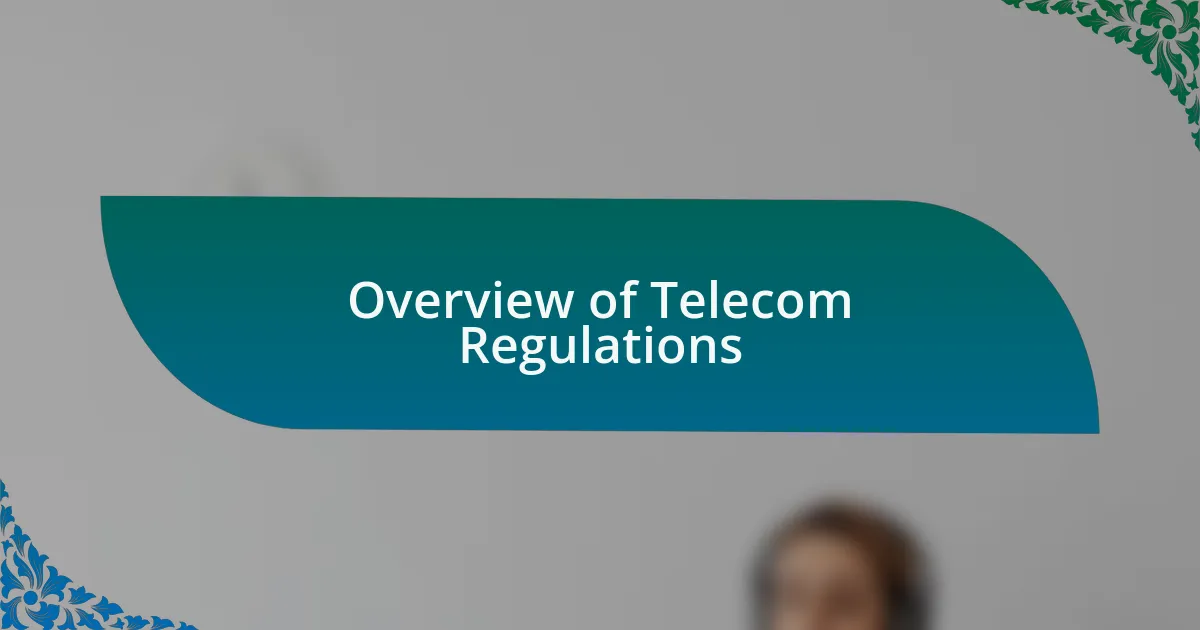
Overview of Telecom Regulations
Telecom regulations serve as the backbone of communication systems across the globe. I remember navigating the complex landscape of rules when I first entered the industry. It was astounding to realize how diverse regulations can be, even between neighboring countries, each with its own set of compliance requirements and licensing procedures. This variability can create confusion, but it also fosters innovation as companies adapt to different markets.
One of the key aspects of telecom regulations is their impact on competition and consumer protection. I once witnessed a telecom start-up struggle due to overly stringent rules which favored bigger, established players. It got me thinking: how can regulators balance the needs of consumers and providers to ensure a thriving marketplace? It’s a delicate dance that requires constant adjustment as technology evolves.
Regulatory frameworks often emphasize issues like bandwidth allocation, pricing, and quality of service, shaping how businesses operate. During a project on network expansion, I saw firsthand the influence of these regulations on our strategy and planning. Reflecting on that experience, it’s clear that the right regulations not only safeguard consumers but also inspire telecom companies to innovate and excel in providing quality service.
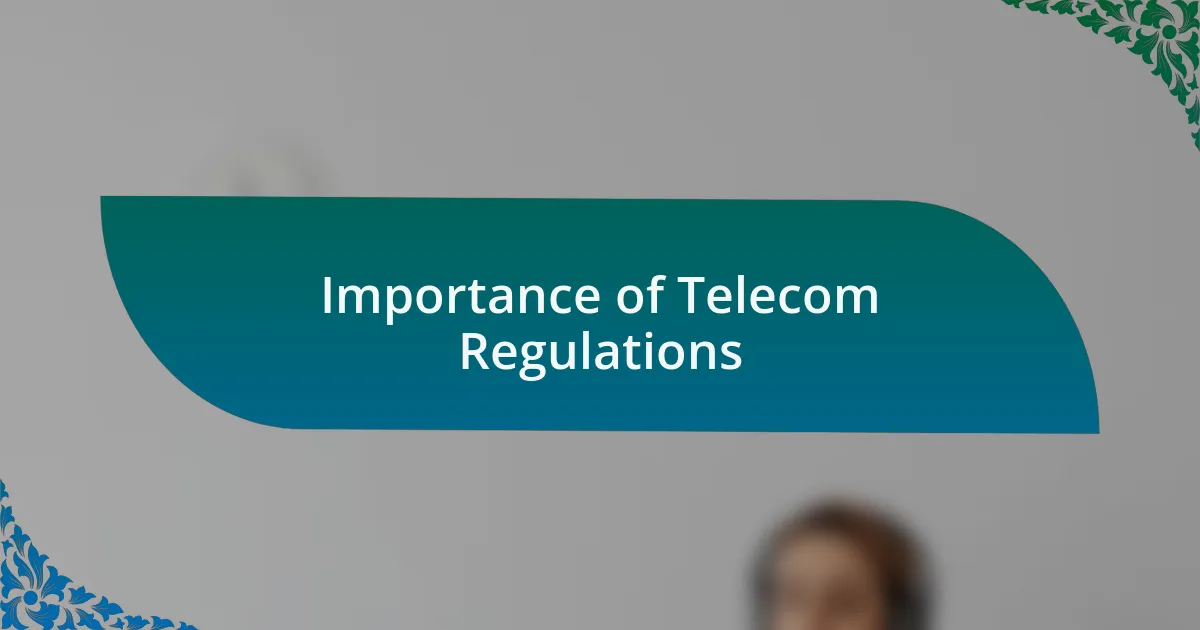
Importance of Telecom Regulations
Understanding the importance of telecom regulations is crucial for anyone involved in this sector. I remember working on a cross-border project where compliance became a focal point. It struck me how regulations not only laid down the law but also encouraged consistent service quality across various regions. Without these rules, can you imagine the chaos that would ensue if different companies operated under different standards? The thought alone underscores the need for cohesive regulations that ensure reliability.
From my experiences, I’ve seen how regulations are instrumental in protecting consumer rights. A few years back, I encountered a situation where a new telecom service provider failed to disclose hidden fees, leaving customers in a bind. It was during moments like that I truly appreciated the protective frameworks in place. They are not just bureaucratic obstacles; they serve to create a fair playing field, allowing consumers to make informed choices and feel secure in their communications.
Moreover, telecom regulations also drive innovation by prompting companies to diversify their offerings. I recall a time when regulations pushed my team toward developing a more user-friendly application to comply with accessibility standards. Initially, it felt restrictive, but in hindsight, it inspired us to create something impactful. Regulation may seem like a hurdle at times, but could it actually be the catalyst for improved services and technologies that benefit everyone?
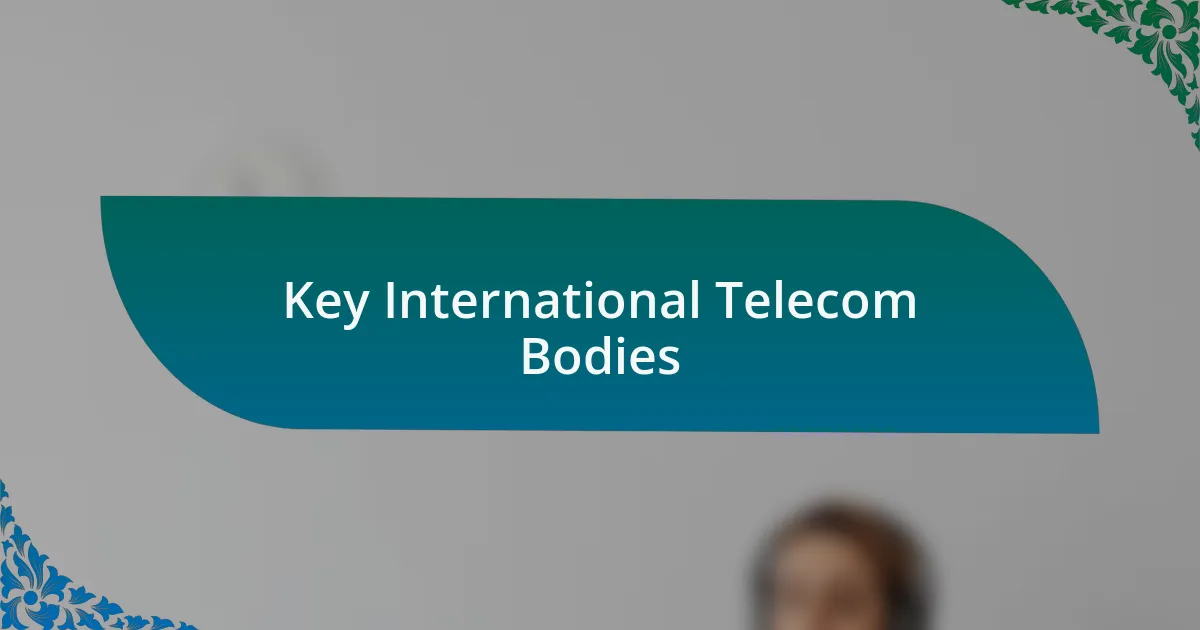
Key International Telecom Bodies
When it comes to international telecom regulations, certain key organizations play a pivotal role in shaping policies and standardizing practices across borders. One of the foremost bodies is the International Telecommunication Union (ITU), which I found to be integral during my work on global projects. Their guidelines helped ensure that various operators adhered to the same technical standards, which ultimately facilitated smoother communication and connectivity. Have you ever relied on international connectivity? It’s amazing how these standards truly pave the way for seamless communication.
Another significant player is the Body of European Regulators for Electronic Communications (BEREC). I recall a moment when their consultations influenced our approach to market entries. By following their recommendations, we avoided potential pitfalls and built a more robust framework for our services. It emphasized the importance of being attuned to regulatory bodies, as their insights can shape not just compliance but strategic decisions as well. It begs the question: how often do companies tap into these resources when expanding their reach?
Finally, the Federal Communications Commission (FCC) also holds weight in international discussions, particularly regarding agreements that affect North American telecom markets. I learned firsthand how their policies on spectrum management can impact global business strategies. Navigating the complex landscape of international regulations taught me that a collaborative approach between these bodies is essential for the advancement of the telecom sector. What challenges have you faced when trying to align with differing international regulations?
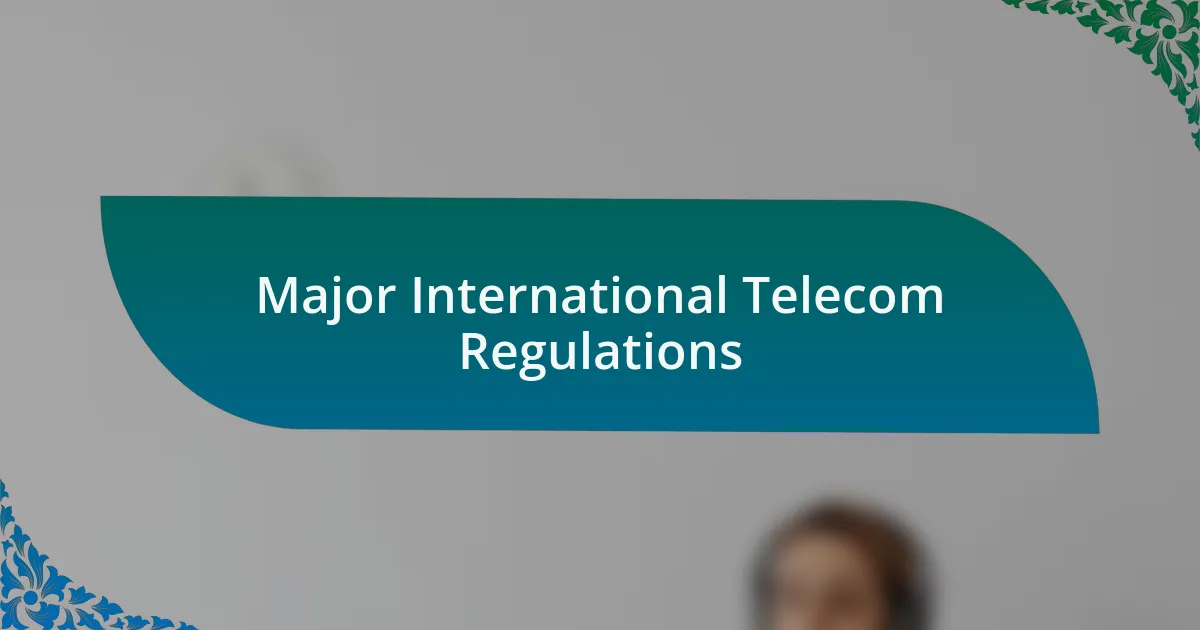
Major International Telecom Regulations
When discussing major international telecom regulations, I can’t help but think about the impact of the World Trade Organization (WTO) agreements, specifically the General Agreement on Trade in Services (GATS). During one project I was involved in, compliance with GATS was crucial for entering developing markets. It opened my eyes to how adhering to global regulations can create a level playing field for telecom services, allowing for fair competition. Have you ever wondered how regulations can shape the landscape of your business opportunities?
Another important regulation set comes from the International Telecommunication Regulations (ITRs), established by the ITU. While navigating these rules in a past role, I faced challenges in aligning our service offerings with ITRs, which was vital in ensuring our services were interoperable internationally. This experience underscored that ITRs are not just bureaucratic layers, but essential frameworks that facilitate global communication. It’s fascinating to see how these regulations help determine pricing structures for services across borders, don’t you think?
On a practical level, the relevance of the European Union’s Electronic Communications Code (ECC) cannot be understated. I remember a project where understanding the ECC’s stipulations on consumer protection greatly influenced our market strategy in Europe. The realization that regulations can serve to protect both providers and consumers was enlightening. Isn’t it amazing how these regulatory frameworks can foster a more responsible telecom landscape for all stakeholders involved?
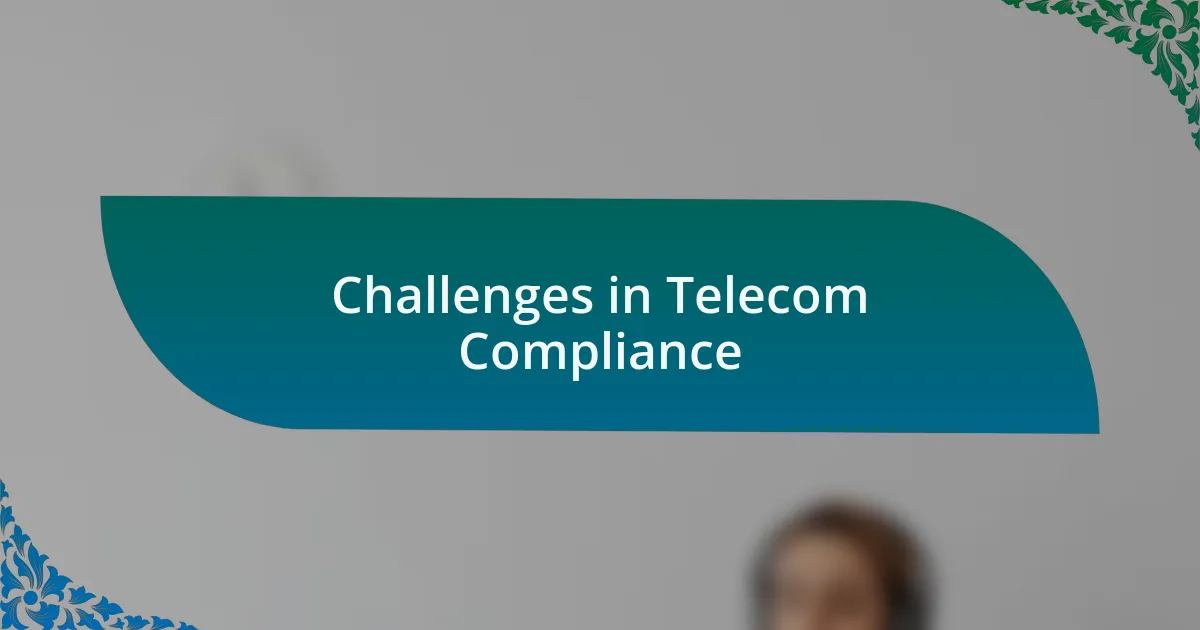
Challenges in Telecom Compliance
Navigating telecom compliance can feel like trying to hit a moving target. I recall a scenario where my team struggled with constantly changing regulations across different countries. It was frustrating to keep our policies aligned while ensuring we didn’t inadvertently fall foul of any local laws. Have you ever felt that pressure?
One of the most daunting challenges I’ve faced is understanding the local nuances in regulations, especially with privacy laws. In a recent project, we had to implement strict data protection measures that varied wildly from one region to another. It felt like a puzzle with missing pieces, and the stress of ensuring compliance weighed heavily on me. How often do we underestimate the complexity of these variations?
Additionally, the financial ramifications of non-compliance can be severe. I remember when a colleague shared their experience of dealing with hefty fines due to oversights in compliance checks. It made me acutely aware of the importance of meticulous attention to detail in every single aspect of our operations. How do we balance the need for rapid innovation with the necessity of stringent compliance? It’s a delicate dance, isn’t it?

Lessons Learned from My Experience
When I reflect on my journey with international telecom regulations, one key lesson stands out: adaptability is crucial. I recall a time when we launched a new service without fully considering the implications of local regulations, which led to unexpected delays. That experience taught me that remaining flexible and open to change can often be the difference between success and setbacks.
Another lesson I learned is the value of collaboration across teams. There was an instance where my focus was solely on regulatory compliance, but I underestimated the insights IT and marketing could provide. As soon as we started working together, we were able to identify potential compliance issues early on, which not only streamlined our processes but also fostered a sense of teamwork. Have you experienced the benefits of collaboration in your work?
Lastly, communication cannot be overstated. I vividly remember a compliance meeting where a seemingly minor regulation change became the focal point of our discussion. That single conversation spurred countless adjustments in our strategy and reinforced my belief that keeping the lines of communication open—both within the team and with regulatory bodies—can prevent many pitfalls. Have you ever had a moment where effective communication turned a situation around for you?